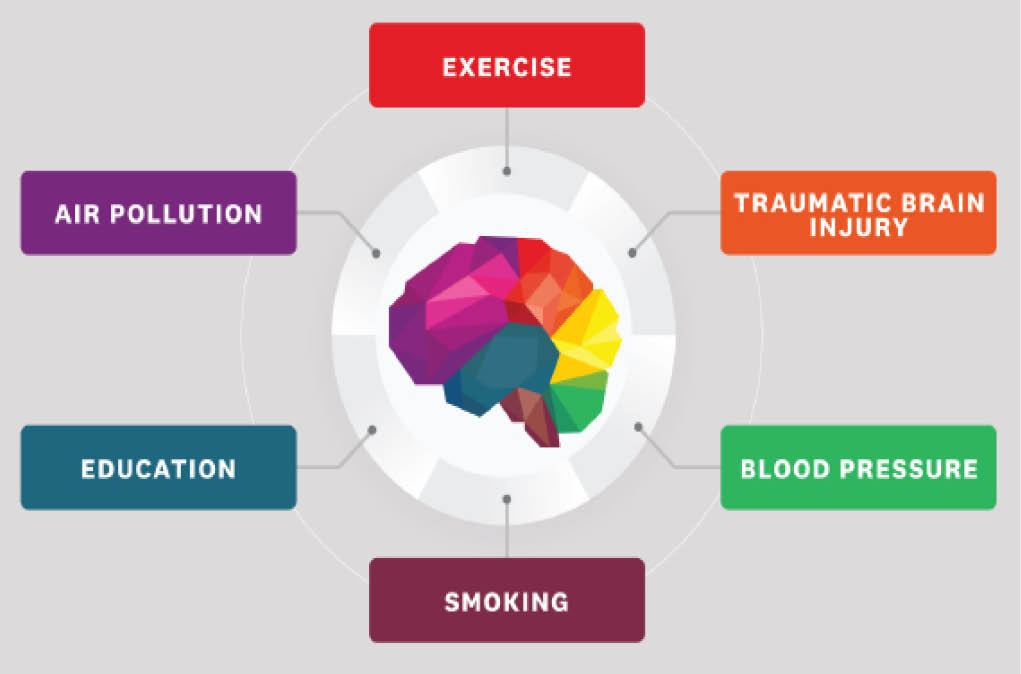At least 12 risk factors contribute to the chances of getting dementia, and modifying them over the course of a lifetime could delay or prevent 40% of dementia cases, a new study has found.
The study is an update to the 2017 Lancet Commission on dementia prevention, intervention and care, and is being presented at the Alzheimer’s Association International Conference (AAIC 2020).
The previous commission identified nine risk factors to which three new risk factors have been added— excessive alcohol intake, head injury in mid-life, and exposure to air pollution in later life.
The three new risk factors combined are associated with six in 100 of all dementia cases.
The remaining nine risk factors are associated with 34 in 100 of all dementia cases.
The factors associated with the greatest proportion of dementia cases in the population are less education in early life, hearing loss in mid-life, and smoking in later life.
Here’s how the 12 risks stand out against the estimated percentage of dementia cases associated with them:
- early life education contributes 7%,
- mid-life hearing loss 8%,
- mid-life brain injury 3%,
- mid-life hypertension 2%,
- consuming more than 21 units of alcohol per week in mid-life contributes 1%,
- mid-life obesity 1%,
- smoking 5%,
- depression 4%,
- social isolation 4%,
- physical inactivity 2%,
- diabetes 1%, and
- air pollution 2%.
Dementia is not a single disease itself. It is a broad term to describe symptoms of impairment in memory, communication and thinking.
Around 50 million live with it worldwide, and the number is projected to increase to 152 million by 2050.
Two out of every three people with dementia live in low-income and middle-income countries, and the biggest rise in dementia prevalence is projected there.
Its impacts on individuals, their families and the economy raises global cost of dementia to about $1 trillion each year.
“In low- and middle-income countries, the higher prevalence of dementia risk factors means an even greater proportion of dementia is potentially preventable than in ‘higher-income countries,” said the report co-author, Professor Adesola Ogunniyi, University of Ibadan.
“In this context, national policies addressing dementia risk factors, like primary and secondary education for all and stopping smoking policies, might have the potential for large reductions in dementia and should be prioritised. We also need more dementia research coming from low- and middle-income countries, so we can better understand the risks particular to these settings.”
The Lancet report, led by 28 world-leading dementia experts, calls for nations and individuals to be ambitious about preventing dementia and lays out a set of policies and lifestyle changes to help prevent dementia.
“Our report shows that it is within the power of policy-makers and individuals to prevent and delay a significant proportion of dementia, with opportunities to make an impact at each stage of a person’s life,” says lead author Professor Gill Livingston, University College London, UK.
“Interventions are likely to have the biggest impact on those who are disproportionately affected by dementia risk factors, like those in low- and middle-income countries and vulnerable populations, including Black, Asian and Minority Ethnic communities.
“As societies, we need to think beyond promoting good health to prevent dementia, and begin tackling inequalities to improve the circumstances in which people live their lives. We can reduce risks by creating active and healthy environments for communities, where physical activity is the norm, better diet is accessible for all, and exposure to excessive alcohol is minimised.”
To address risk of dementia, the Lancet report list nine recommendations for policy makers and individuals:
- Aim for blood pressure of 130mmHg or less from aground age 40
- Encourage use of hearing aids for hearing loss and reduce hearing loss by protecting ears from high noise levels.
- Reduce exposure to air pollution and second-hand tobacco smoke.
- Prevent head injury (particularly by targeting high risk occupations and transport)
- Prevent alcohol misuse and limit drinking to less than 21 units per week (one unit equal 10ml of pure alcohol)
- Stop smoking uptake and support individuals to stop smoking (which the authors stress is beneficial at any age).
- Provide all children with primary and secondary education.
- Lead an active life into mid, and possibly later life.
- Reduce obesity and diabetes.
These actions are especially important in LMICs where dementia rates are rising more rapidly than in high-income countries. This is a result of increasing life expectancy, and a higher frequency of certain dementia risk factors – such as lower rates of education; high rates of hypertension, obesity, and hearing loss, and rapidly growing rates of diabetes.



